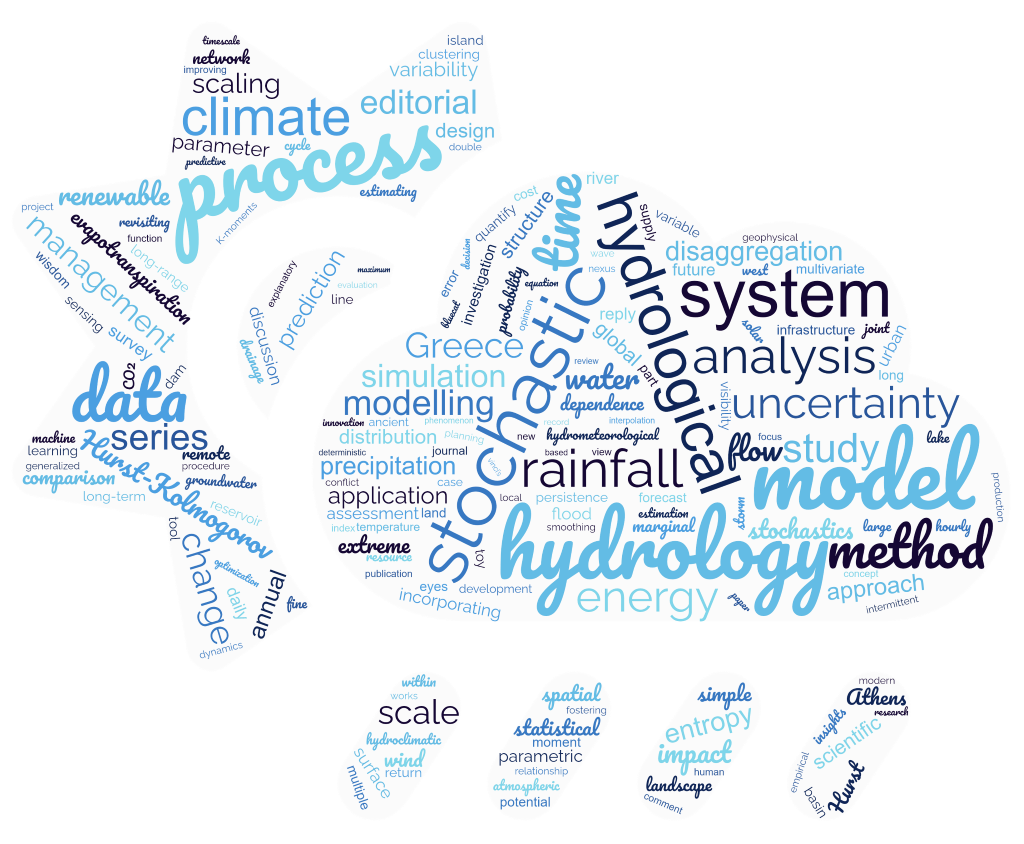Demetris Koutsoyiannis Home Page
| Demetris Koutsoyiannis is professor emeritus of Hydrology and Analysis of Hydrosystems in the National Technical University of Athens. He has served as Dean of the School of Civil Engineering, Head of the Department of Water Resources and Environmental Engineering, and Head of the Laboratory of Hydrology and Water Resources Development. He was Editor of Hydrological Sciences Journal for 12 years (2006-18), and member of the editorial boards of Hydrology and Earth System Sciences, Journal of Hydrology, Water Resources Research, Hydrology, Sci, and Science of Climate Change. He has been awarded the International Hydrology Prize– Dooge medal (2014) by the International Association of Hydrological Sciences (IAHS), UNESCO and World Meteorological Organization (WMO), and the Henry Darcy Medal (2009) by the European Geosciences Union (EGU). His distinctions include the Lorenz Lecture of the American Geophysical Union (AGU) (San Francisco, USA, 2014) and the Union Plenary Lecture of the International Union of Geodesy and Geophysics (IUGG) (Melbourne, Australia, 2011). He has served as professor of Hydraulics at the Hellenic Army’s Postgraduate School of Technical Education of Officers Engineers (Athens, 2007-10). He has been visiting academic/professor at the Imperial College (London, 1999-2000), Hydrologic Research Center (San Diego, 2005), Georgia Institute of Technology (Atlanta, 2005-06), University of Bologna (2006 & 2019) and Sapienza University of Rome (2008 & 2019). |  |
Contributions at a glance: Google Scholar | ResearchGate | Semantic Scholar | Scopus | Web of Science | ORCID
Activities and publications: CV | Appendix to CV | Publications in journals | List of all publications
Blogs (Substack) | In English: Climath | Remniscences | In Greek: Κλιμάθ | Αναμνίσεις
Other: Itia team | Itia repository | Itia meteo station | Itia blog | Educational material (old site in Greek) | Contact
Main research contributions – Views and opinions
|
Question |
Keywords of contribution |
|
What determines the nature and properties of hydrological and geophysical processes? Why these processes exhibit seemingly peculiar behaviours, such as long-term persistence, fluctuations on large scales, clustering, state and time scaling, and heavy distribution tails? |
|
|
Are future climate projections reliable and do they provide grounds to assess impacts in hydrological processes? How well does current climate research represent the intrinsic climate uncertainty? What is the relationship of climate with stochastics? |
|
|
What are the main characteristics and implications of the Hurst-Kolmogorov stochastic dynamics (also known as the Hurst phenomenon, Joseph effect, scaling behaviour, long-term persistence, multi-scale fluctuation, long-range dependence, long memory)? |
|
|
How can we effectively and consistently describe the behaviour of extreme rainfall and flood? Are hydrological practices for estimating extreme rainfall appropriate? What is the value of the concept of probable maximum precipitation and flood? |
Extreme rainfall: Probabilistic description vs. probable maximum precipitation |
|
Do hydrological processes reveal deterministic chaos? Do they exhibit deterministic trends? Or can they be better modelled as stochastic processes? |
Deterministic vs. stochastic representation of hydrological processes |
|
How can we build stochastic models of hydrological processes effectively and parsimoniously describing the natural behaviours and peculiarities? How can these behaviours be modelled in a multivariate setting? |
|
|
How can we disaggregate hydrological data? How can we couple stochastic models of different time scales? |
|
|
How can we develop and calibrate models of the hydrological cycle or its components? |
|
|
How can we more effectively model and manage large hydrosystems? Can we combine simulation and optimization techniques? How many decision variables do we need in the management of a large hydrosystem? How can we perform global or multicriteria optimization of hydrosystems? |
|
|
How recent are the modern technologies and management practices in water supply, wastewater, and agricultural water use? What is the contribution of Ancient Greece in hydrological and hydraulic science and technology? |
|
|
What are the pathologies of the scientific publishing system and how can it be improved? |
